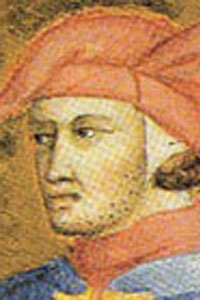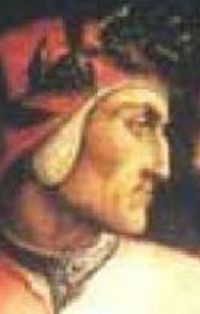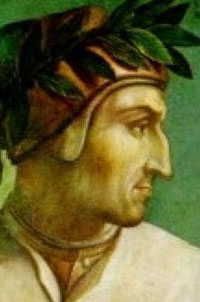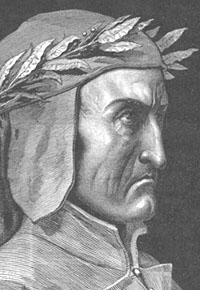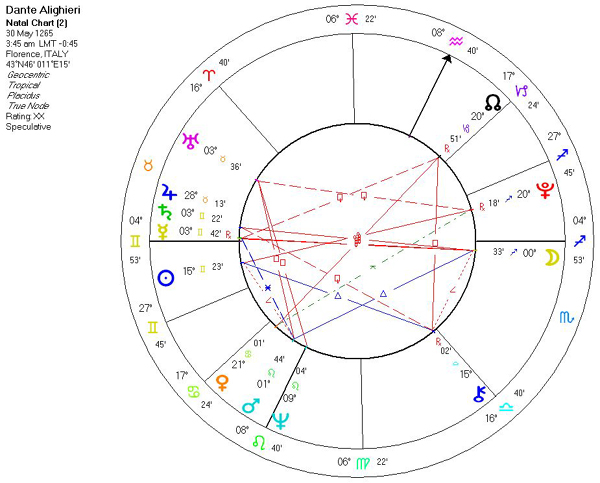Copyright Michael D. Robbins 2006
Astro-Rayological Interpretation & Charts
Quotes
Biography
Images and Physiognomic Interpretation
I wept not, so to stone within I grew.
Abandon all hope, you who enter here!
There is no greater sorrow than to recall a happy time in the midst of wretchedness.
(Saturn conjunct Jupiter.)O conscience, upright and stainless, how bitter a sting to thee is a little fault!
(Virgo on cusp of 5th house?)Heat cannot be separated from fire, or beauty from the eternal.
A fair request should be followed by the deed in silence.
For what is liberty but the unhampered translation of will into act?
(Uranus square Mars)He listens well who takes notes.
(Mercury in Gemini conjunct Saturn & Ascendant.)I love to doubt as well as know.
(Mercury in Gemini conjunct Saturn & Ascendant and opposition Moon in Sagittarius! Venus in 3rd house.)The hottest places in Hell are reserved for those who, in time of great moral crises, retained their neutrality.
(Mars in Leo in 3rd house.)The customs and fashions of men change like leaves on the bough, some of which go and others come.
(Mercury in Gemini.)For where the instrument of intelligence is added to brute power and evil will, mankind is powerless in its own defense.
(Sun in Gemini opposition Pluto in Sagittarius.)The purpose of the whole (work) is to remove those who are living in this life from a state of wretchedness and lead them to the state of blessedness.
(Venus in Cancer. Chiron T-squaring Nodes.)Remember tonight.. for it is the beginning of always.
Small projects need much more help than great.
The secret of getting things done is to act!
(Mars in Leo trine Moon in Sagittarius.)We must overact our part in some measure, in order to produce any effect at all.
(Mars in Leo.)Mankind is at its best when it is most free. This will be clear if we grasp the principle of liberty. We must recall that the basic principle is freedom of choice, which saying many have on their lips but few in their minds.
(Uranus square Mars & Neptune.)There's not the least thing can be said or done, but people will talk and find fault.
Beauty awakens the soul to act.
(Venus in Cancer)I made my own house be my gallows.
You shall find out how salt is the taste of another man's bread, and how hard is the way up and down another man's stairs.
O human race, born to fly upward, wherefore at a little wind dost thou so fall?
Art imitates nature as well as it can, as a pupil follows his master; thus it is sort of a grandchild of God.
Dante Alighieri was a Florentine poet. His greatest work, The Divine Comedy, is considered the greatest literary statement produced in Europe in the medieval period, and the basis of the modern Italian language. The essence of Dante's philosophy is that all virtues and all vices proceed from love. Dante may be said to have made Italian poetry, and to have stamped the mark of his lofty and commanding personality upon all modern literature.
Dante was born in circa May 29, 1265 – died, September 14, 1321. He says he was born under the sign of Gemini, placing his birthday in May or June. His own statement in the "Paradiso" (xxii, 112-117) that he was born when the sun was in Gemini, fixes his birthday between 18 May and 17 June.
He was born into the prominent Alighieri family of Florence, and Dante asserted his family descended from the ancient Romans (but the earliest relative he can mention by name is of no earlier a date than about 1100). Dante's mother died when Dante was 5 or 6 years old, and his father soon married, or at least bore two children, Dante's half-brother Francesco and sister Tana (Gaetana).
When Dante was 12, in 1277, he was promised in marriage to Gemma, daughter of Messer Manetto Donati. Contracting marriages at this early age was quite common, and was an important ceremony, requiring formal deeds signed before a notary. Dante had several sons with Gemma. While uncertain, it seems there were just three children, Jacopo, Pietro, and Antonia
Not much is known about Dante's education, and it is presumed he studied at home. We know he studied Tuscan poetry, His interests brought him to discover Provençal minstrels and poets, and Latin culture (with an obvious particular devotion to Virgil). When 18, he met others and with them became leaders of Dolce Stil Nuovo (The Sweet New Style).
When he was nine years old he met Beatrice Portinari, the daughter of Folco Portinari, with whom he fell in love "at first sight", and apparently without even having spoken to her. He saw her frequently after age 18, often exchanging greetings in the street, but he never knew her well. It is hard to decipher of what this love consisted, but something extremely important for Italian culture was happening: as it is in the sign of this love that Dante gave his imprint to the Stil Novo and would lead poets and writers to discover the themes of Love (Amore), which had never been so emphasized before. Love for Beatrice (as in a different manner Petrarca would show for his Laura) would apparently be the reason for poetry and for living, together with political passions.
After the death of Beatrice in 1290, he plunged into intense study of classical philosophy and Provençal poetry. This woman, thought to have been Beatrice Portinari, was Dante’s acknowledged source of spiritual inspiration.
Dante married Gemma Donati, had three children, and was active (1295–1300) as councilman, elector, and prior of Florence. In the complex politics of Florence, he found himself increasingly opposed to the temporal power of Pope Boniface VIII, and he eventually allied himself with the White Guelphs. After the victory of the Black Guelphs he was dispossessed and banished (1302). Exile made Dante a citizen of all Italy; he served various princes, but supported Holy Roman Emperor Henry VII as the potential savior of a united Italy. He died at the court of Guido da Polenta in Ravenna, where he is buried.
A few years before his exile Dante had married Gemma di Manetto Donati, a distant kinswoman of Corso, by whom he had four children. He never saw his wife again; but his sons, Pietro and Jacopo, and one of his daughters, Beatrice, joined him in later years.
At first, he made common cause with his fellow-exiles at Siena, Arezzo, and Forli, in attempting to win his way back to Florence with the aid of Ghibelline arms. Dante's name occurs in a document of 8 June, 1302 among the exiled Bianchi who at San Godenzo in the Apennines were forming an alliance with the Ubaldini to make war upon the Florentine Republic; but, in a similar agreement signed at Bologna on 18 June, 1303, he no longer appears among them. Between these two dates he had made his resolution to form a party by himself (Par., xvii, 61-68), and had sought refuge in the hospitality of Bartolommeo della Scala, the lord of Verona, where he first saw Can Grande della Scala, Bartolommeo's younger brother, then a boy of fourteen years, who became the hero of his later days. Dante now withdrew from all active participation in politics.
Dante's vehement denunciation of the ecclesiastical corruption of his times, and his condemnation of most of the contemporary popes (including the canonized Celestine V) to hell have led to some questioning as to the poet's attitude towards the Church.
Dante’s reputation as the outstanding figure of Italian letters rests mainly on the Divine Comedy, a long vernacular poem in 100 cantos (more than 14,000 lines) composed during his exile. Dante entitled it Commedia; the adjective Divina was added in the 16th cent. It recounts the tale of the poet’s journey through Hell, Purgatory, and Heaven, and is divided accordingly into three parts.
A magnificent synthesis of the medieval outlook, the Divine Comedy pictures a changeless universe ordered by God; its allegorical theme is the gradual revelation of God to the pilgrim. It is also a religious dialogue on the gradations of earthly sin and piety as well as on such topics as predestination and classical philosophy. The symbolism is complex yet highly rational; the verse is musical; and the entire work is one of great imagination. Through his masterpiece Dante established Tuscan as the literary language of Italy, surpassed all previous Italian writers, and gave rise to a vast literature.
The strong Saturnian nose and look of severity may be shown in his Saturn conjunct Mercury on the Gemini Ascendant.
